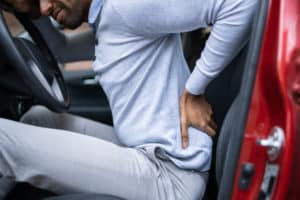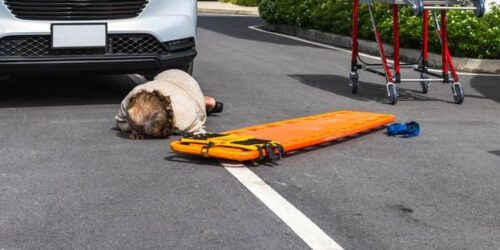
Common Car Accident Injuries and How Nerves Are Affected
Whiplash
When it comes to car accident injuries, the most common of all is whiplash. Whiplash refers to the experience where your chest and torso may be restrained by the seat belt but your head and neck are left vulnerable to the force of the accident. Upon impact, your head and neck may be flung violently forward and backward, straining your neck muscles and damaging the spine in your neck. When your neck muscles are stressed out of their normal range of motion it can cause swelling and even muscle tears. Your swollen muscles may put excessive pressure on nearby nerves, affecting their functioning. The vertebrae in your neck may also become misaligned and compress nearby nerves. Common whiplash symptoms can include headaches, stiff muscles, and, numbness and tingling.
Herniated Disc
A herniated disc can occur with whiplash or another type of spinal injury. Also commonly referred to as a slipped disc, a herniated disc means the spongy, shock absorber that separates two vertebrae has slipped or been forced out of normal positioning. When the disc is out of place it can compress nearby nerves, sending signals of pain, tingling, and numbness to different parts of your body. You may also sustain a herniated disc from blunt-force trauma during the accident, which can also lead to too much pressure applied to nearby nerves.
Spinal Injury
Unfortunately, there are many car accident injuries that can affect your spine and lead to pinched nerves or other damage. That’s because your nervous system actually runs through your spine, and this series of nerves are all connected and send communication and signals to the rest of your body. When your spine is injured or damaged, your nervous system may be too. Swelling, bruising, and lacerations near the spine can compress nerves and lead to pain and tingling sensations that are typically signs of a pinched nerve.
Symptoms of a Pinched Nerve
A pinched nerve is also called a compressed nerve and both of these terms refer to how the nerve is experiencing abnormal pressure. The most common symptom of a pinched nerve is often referred to as “pins and needles”, which is a tingling sensation that can also be painful or uncomfortable. Other symptoms of a pinched nerve include decreased sensation or numbness, which is commonly associated with your foot or leg “falling asleep” after you’ve been sitting for too long. When a nerve is compressed it may not receive enough blood flow or oxygen, which can result in loss of sensation and numbness. It is also possible to experience muscle weakness. You may also experience burning aches or pains, which are signals that the nerve is irritated.
Treating a Pinched Nerve
It is incredibly important to visit an accident doctor after a car accident, no matter how small. While scrapes and bruises are easy to see and treat, other internal issues can develop and cause serious problems if not addressed right away. If you start to notice any pain, tingling, or numbness after a car accident then see your doctor as soon as possible for a possible pinched nerve diagnosis and treatment plan.
When it comes to treating car accident injuries, your doctor will want to determine what is causing the pinched nerve in order to provide lasting relief from your symptoms. In mild cases, your doctor may recommend at-home remedies like ice and heat therapy to help with inflammation and strained muscles. However, many cases of a pinched nerve after a car accident may need medical intervention. A chiropractor can examine your spine for misalignments or imperfections in your posture that may be causing the pinched nerve and use gentle adjustment techniques to resolve the issue.
Many cases of a pinched nerve after a car accident can be treated with conservative, non-invasive treatments. At ProCare Medical Centers, our team of primary care doctors, chiropractors, and neurologists can address a wide variety of car accident injuries, including pinched nerves. Walk-ins are available and you can also schedule an appointment online.




